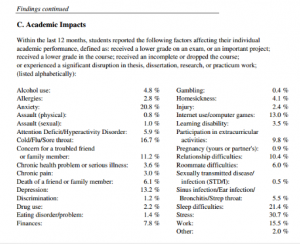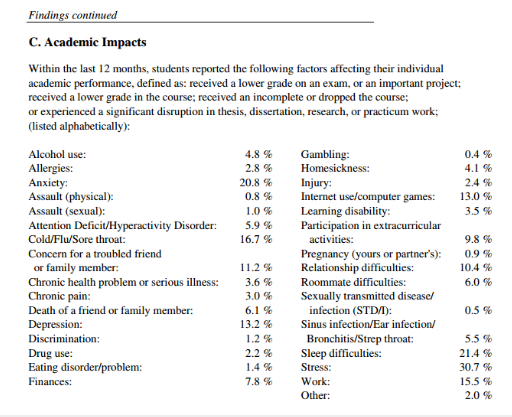This fall, St. Thomas will participate in the American College Health Association (ACHA) student survey to collect and compare health data with colleges across the nation.
The new survey will replace a St. Thomas-specific survey which the university has issued since 2002. Covering topics such as sleep, anxiety, drug use, alcohol consumption, diet, sexual activity and violence, the confidential survey will be issued to 1,400 random St. Thomas students equally divided between males and females and covering all undergraduate years.
Madonna McDermott, director of Health Services and the Wellness Center, has been working with other faculty to get St. Thomas to use the national survey for a number of years.
“We wanted to use the national survey, which has been tested for reliability and validity,” McDermott said. “Then we can benchmark against all the other colleges and universities around the country.” 
While it’s similar to the previous St. Thomas survey, the new format will include more sensitive questions about sexual activity and orientation. According to McDermott, concern about introducing these questions at a Catholic university is one reason it took years to switch to the national survey.
“Some people think that if you ask that kind of question it may encourage someone to participate in that action,” McDermott said. “Research says that is not the case.”
In order to involve St. Thomas in the survey, McDermott and her colleagues looked at other Catholic universities that used the survey, and they found that asking questions about sexual orientation, sexual behavior and other sensitive topics doesn’t impact students’ behavior.
McDermott said it’s crucial to include such questions.
“It’s like if we were an institution that decided not to address mental health. You can’t just cut the head off and say it’s going to be okay,” McDermott said. “Sexuality is a part of the natural human being, and therefore we need to address it from a health perspective so that people are healthy.”
Senior John Kumerow doesn’t think there should be hesitation in addressing sexual issues.
“I definitely feel those (questions) should be addressed here,” Kumerow said. “Just because we’re Catholic doesn’t mean we don’t have those problems here. It’s still important to know that if we do have those problems, they can be addressed,” Kumerow said. “It’s just good for the institution to know what’s going on.”
In addition to addressing a wider variety of topics, the new survey provides more balanced data for researchers and students.
“We strengthen the national pool of data,” McDermott said. “The more people you have participating in a standardized study, the stronger the results are. It’s used a lot on the national level, on the federal level for making sure that student’s voices on health and wellness are found on the legislative end of things. It’s an important tool to be participating in.”
McDermott said St. Thomas will also benefit from using the ACHA survey.
“There’s several benefits,” McDermott said. “One is to see if there’s any particular area that we differ from other populations. We’re not the same as the University of Minnesota … our needs are a little bit different. And so for us to participate in a reliable valid tool makes us more confident that we’re identifying the leading health indicators that we need to focus on.”
Senior Kaitlyn Benik said she thinks a broad survey like this one is important to have at St. Thomas.
“I think it will give administration more of an idea of what goes on within the school from student’s perspective,” Benik said.
Simeon Lancaster can be reached at lanc4637@stthomas.edu.



